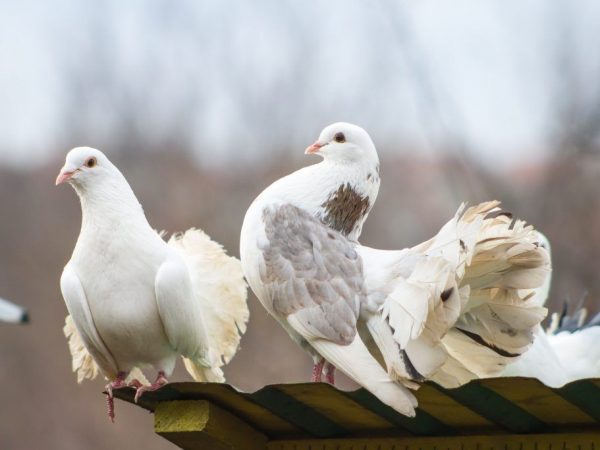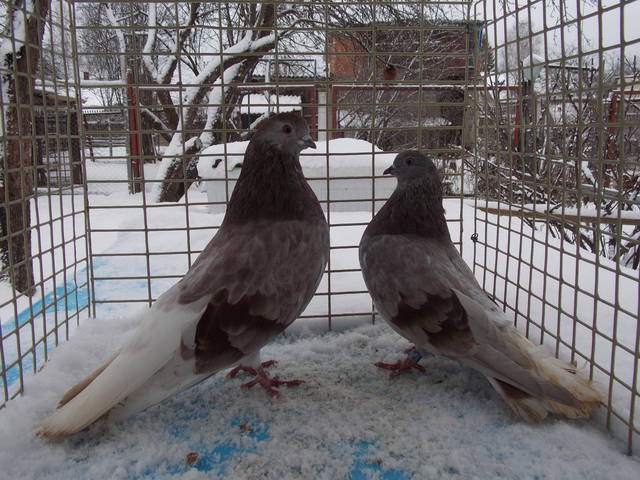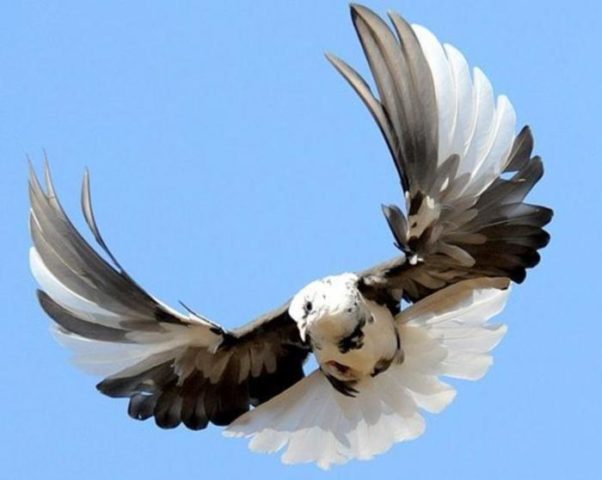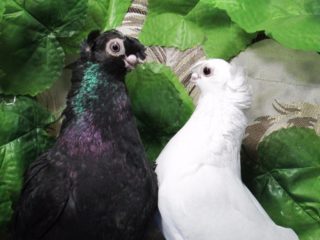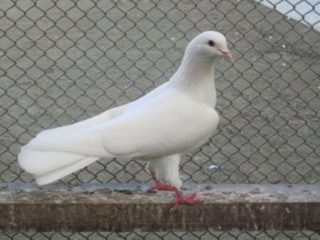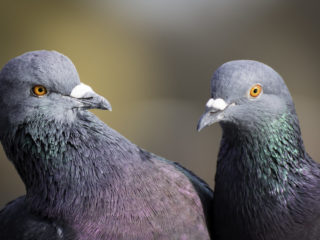Content
In Vladimir Menshov's film Love and Doves, the theme of love is revealed from a curious side, in which birds play an important role, being a symbol of this feeling.
Izhevsk pigeons - the standard of loyalty and love. This breed is one of the few, whose representatives do not move away from the dovecote to the side, but rise up to such a height that they are practically invisible. Close up, these birds are beautiful and graceful.
History of the Izhevsk breed of pigeons
The history of the emergence of this breed is amazing. Pigeons were tamed by people 5 millennia ago and served as a means of communication. But not only this attracted people in pigeons. The man admired the beauty and grace of the body of this bird, the beauty of flight and a pleasant murmur when communicating.
Izhevsk pigeons are similar to the closest relatives - Perm pigeons.
It is believed that the breed appeared 100 years ago, but there is information that the pigeons themselves were brought to Izhevsk at the beginning of the 19th century, when, by order of the tsar, an arms factory was built, and craftsmen were taken out of Tula to work on it. Here they, along with the property, brought pigeons, probably in order to maintain correspondence with the relatives who remained in Tula.
How many years was spent on breeding, and what breeds were used in this case, one can only guess, but it hardly took a hundred years. From the stories of Izhevsk pigeon breeders, it is known that there are other names for this breed in the city - Tikhonovsky, Matveyevsky, Aleksandrovsky, according to the names of local breeders. There were even Povarskys, in memory of the fact that among the participants in the creation of this breed was a man by profession.
This is how the breed of Izhevsk pigeons appeared, the main advantage of which is the amazing ability to fly at an unattainable height.
Flight characteristics
The flight of the Izhevsk pigeons is mesmerizing. Being large in size, they take off to such a height that it is difficult to see them from the ground. The flock circles at an inconceivable height, but does not fly away from the house for long distances.
The flock spends more than 2 hours in the sky, and up to 15 hours in flight. To maintain the ability to fly, after the flight, the pigeons must be allowed to rest for 2-3 days. You also need a high-calorie diet.
Izhevsk pigeons are released into flight every day for 5-6 hours. The weather should be dry and calm. There is a risk that in a strong wind the flock will scatter, and one of the pigeons will be lost or even die. If a pigeon strays from the flock, it may not return.
If the dovecote is equipped with lighting outside, then the birds are launched in the dark.
To enjoy the flight of the Izhevsk pigeons, they are trained. They start cooking from a young age. Otherwise, the bird will sit out, and its flying qualities will deteriorate or disappear. The training is carried out in several stages:
- The pigeons get to know the person who will train them. The coach enters the dovecote at the same time every day. You need to take the same clothes, always clean. Pigeons gradually get used to it and begin to show their attitude to the coach, sit on him, eat from his hands. The trainer examines all young animals.Attention! Smell is important for pigeons. It is better if the clothes will only be used to meet them.
- After 40 days, the young are taught to fly from the nursery to the aviary. If it suddenly turns out that they are weak for such a procedure, it is postponed for a couple of weeks. When classes resume, they are held for 5 days.During this time, they find out the behavior in the flock, whether there are pronounced loners, what they are afraid of and how they react to other people and animals.
- The pigeons are released onto the roof. This is where the pigeons get used to the free space. This lasts 5 days, after which they start flying. Birds do not fly far and return quickly. The coach must understand how they feel in flight, at altitude, how they find their way home. A leader is selected from experienced birds, and with him the young are released into flight - with a flock and one at a time. It takes a week for young pigeons to learn flight techniques and begin to imitate the leader. When the flight duration increases by more than 40 minutes, young pigeons are combined with the main flock.
- The training is completed when the young bird begins to lose its primary feather and it is time for molting. At this time, the birds are not released. Pigeons that are sick or overworked, females preparing for offspring, are also not trained.
A sign that a bird is well trained is to raise it to a height.
Breed characteristics and standards
When breeding the Izhevsk breed, the Perm was used. The result is good: the individual is muscular, strong, with smooth plumage and at the same time intelligent. Flying in the sky-high distance, he perfectly understands where he is, and unmistakably determines the house.
In pigeon breeding, the question of the purity of the blood of any breed is fundamentally important. For Izhevsk pigeons, there are strict parameters by which they are recognized as purebred:
- muscular and powerful chest;
- body up to 35 cm long;
- when making a rack, the body is slightly tilted;
- the wing in length should almost reach the rectangular tail;
- small round head in males and elongated in females;
- no plumage on short legs;
- the body has smooth plumage;
- small beak, chicken-colored;
- the eyes are slightly bulging, black.
The main characteristic feature of the thoroughbredness of the Izhevsk pigeon is the shape of the head, according to which the sex of the bird is distinguished.
Insignificant deviations in clarification of purebredness are a slight excess in the size of the body, small feathering of the legs, a slightly reduced sternum, a very small beak and a slight brown-eyed.
They do not recognize purebred if the individual is very large, with small wings, an underdeveloped sternum, elongated paws with plumage, gray-blue eyes and ruffled feathers.
Purebred Izhevsk pigeons are beautiful and cheerful, smart and athletic.
Breeding Izhevsk pigeons
It is not difficult to breed Izhevsk pigeons, for this you need to have a well-built dry and warm dovecote. Maintain cleanliness, remove bird excrement. Change the litter, prepare the dovecote for winter, filling up cracks and holes so that there is no draft, which is contraindicated for birds.
Pigeon feeding
Izhevsk pigeons are fed twice a day immediately after the flights. Food should contain the necessary set of nutrients and vitamins, you cannot overfeed. The most acceptable food is cereals.
An adult Izhevsk pigeon needs up to 85 g of grain for every day. In winter, they feed oats - 20 g and barley - 65 g. Lentils and corn grits are also used. Feeding bread and porridge is not allowed, this leads to illness. Flax and rapeseed, when fed, improve plumage. Pigeons of the Izhevsk breed love to swim in the heat.
The standard of living for Izhevsk high-flying pigeons is rest and sitting in a nest or on a perch inside a dovecote. They fly out only to drink and eat. Do not walk pigeons on the ground and on the roof, especially young individuals. Their element is high flights and rest before the next soaring into the sky.
Diseases and treatment of birds
Thoroughbred birds get sick like others. Most often they develop infectious diseases and parasites. The reasons for this are irregular housekeeping, dampness and drafts.
The main diseases are smallpox, salmonellosis and wiggle (Newcastle disease). For preventive purposes, the birds are vaccinated.
The whole flock is inoculated at once.
Before starting vaccinations, the diet is reviewed. Izhevsk pigeons are fed with grain rich in protein, minerals and vitamins. It is necessary to vaccinate only healthy individuals.
Smallpox is vaccinated in those regions where the disease is common. It is better to do this in a veterinary hospital. The vaccine is valid for a year. Salmonellosis is vaccinated twice a year. For the prevention of twisting, Izhevsk residents are vaccinated with Avivak.
If vaccinations are not done, but a sick individual is found, then it is removed and isolated from others. It is not difficult to identify a sick pigeon during everyday examination: it changes behavior, does not take food, hides, feathers lose their smoothness and ruffle. The droppings of such a bird are liquid, discharge from the beak and eyes appears.
The sick individual is not vaccinated, this procedure will kill her, but it is possible to treat and cure.
The pigeon breeders are successfully treated at home, the main thing here is to correctly diagnose the disease and in the first 10 days you can cure a sick bird.
For treatment, a drug in Fosprenil capsules is used. It is effective, has no side effects and is not dangerous to birds. It is injected intramuscularly into the sternum or the pigeon is given to drink through the beak.
But it is preferable to show a sick pigeon to a veterinarian.
To make the birds less sick, they need a balanced diet, fortified with a vitamin complex.
Conclusion
Izhevsk pigeons are good in all respects and deservedly enjoy success with pigeon breeders. They have excellent flying qualities, are unpretentious and hardy. These birds are made for the sky. The feeling of love for them comes not only during dizzying flights, but also from communication with them.
